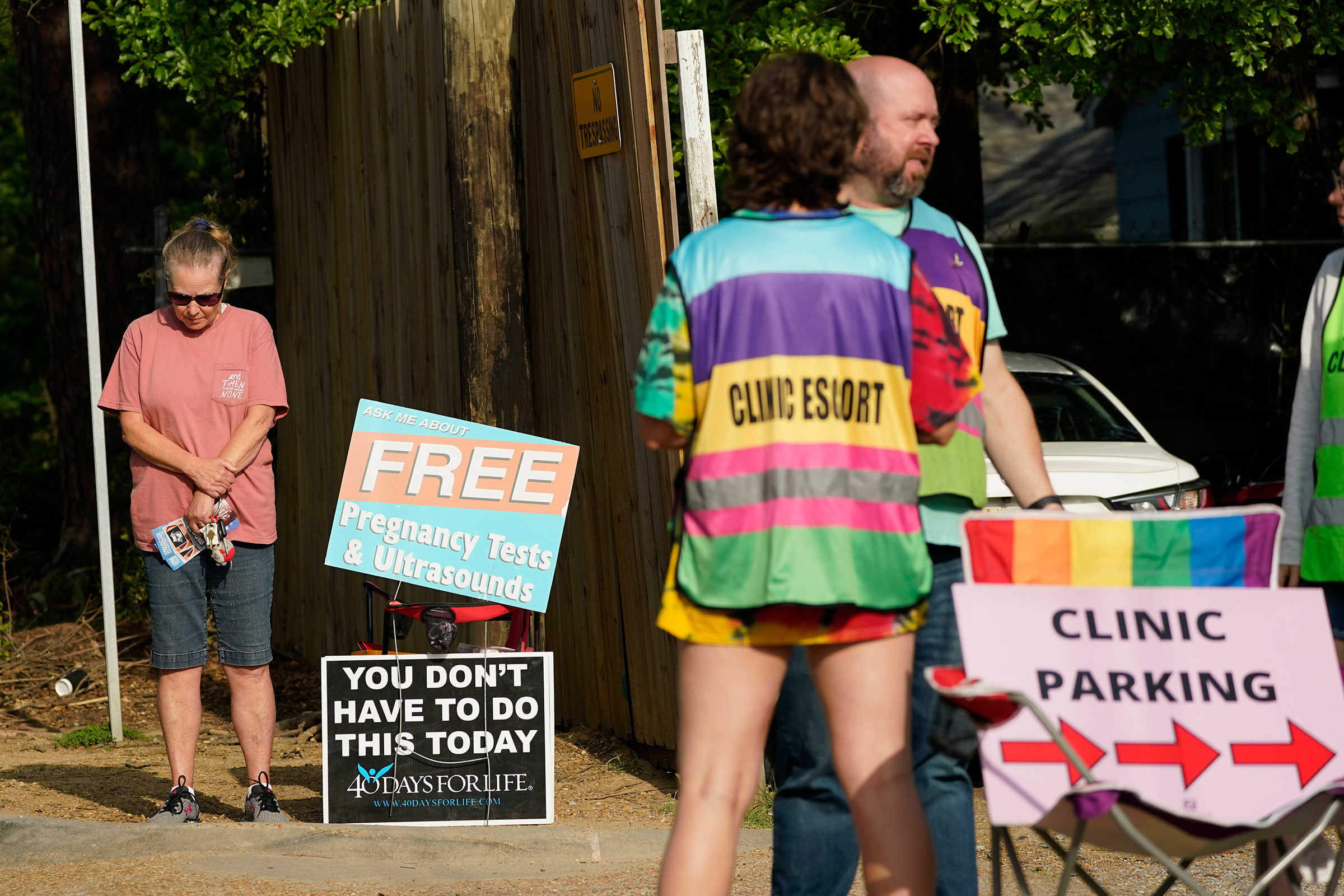In the 49 years since the U.S. Supreme Court established a constitutional right to abortion, the experience of being a woman in this country has transformed.
Birth control access has expanded, and more women have entered the workforce, pursued higher education, won protections from being fired for getting pregnant, and become bread-winners. Through it all, abortion has remained one of the nation’s most fraught topics. While support for legal abortion has mostly gone unchanged—about 60% of Americans believe it should be legal in most or all cases—so has opposition to the procedure. Since the early ’70s, activists and lawmakers who believe abortion is immoral have waged a long, careful battle in state legislatures and the courts in hopes that one day the Supreme Court would overturn Roe v. Wade.
On May 2, it seemed that day was imminent. A leaked draft opinion on Dobbs v. Jackson Women’s Health Organization, a case directly challenging existing precedent, showed the majority of Justices poised to overturn Roe in its entirety. The news landed like a bomb. Within hours, protesters on both sides of the debate crowded outside the Supreme Court building in Washington, dancing in triumph or shaking with rage. Pastors declared victory, politicians sprinted to stake positions, and lawyers scrambled to understand the extraordinary implications of the draft text, pointing to a list of other constitutional rights suddenly in jeopardy, including access to birth control and the ability to marry the person of your choice, regardless of sex or race.
While the opinion leaked to Politico may well change before a final version is released, likely in June, its mere existence reshaped American politics in an instant—upending midterm races and political agendas, and refuting any argument that overturning Roe would affect only a small number of people in conservative states. The fierce and immediate political fallout made clear that any Supreme Court decision changing the precedent that Roe set will affect us all.

For many liberals, the draft marked the worst-case scenario, the doomsday outcome they’d been warning about for years. “It’s devastating, but it’s also a critical wake-up call,” Mini Timmaraju, president of NARAL Pro-Choice America, told reporters. The day after the draft appeared, NARAL saw a 1,403% increase in donations. Planned Parenthood reported a 650% uptick in donations and engagement. Democratic fundraising platform ActBlue raised $12 million in the 24 hours after draft was made public, and the Abortion Care Network, which supports independent abortion clinics nationwide, raised $250,000 in the first three days after the leak from more than 12,000 donors, about 95% of whom were new. Abortion providers also reported a flood of patients seeking birth control appointments, hoping to stockpile emergency contraception, or asking to proactively order abortion pills. Just 16 states and Washington, D.C., have laws on their books that explicitly protect abortion rights, should Roe cease to be the law of the land.
For conservatives, the draft decision was cause for celebration. “If this is the opinion of the Court, it will be one of the greatest opinions in Supreme Court history. It will save millions of lives,” Republican Senator Josh Hawley of Missouri tweeted on May 3. The draft was seen as validation of both conservatives’ strategy and their core belief: that Roe was wrongly decided and that the only way to redress that error was to deliver conservatives onto the highest court. On social media, religious leaders thanked former President Donald Trump, whose three Supreme Court appointments brought this moment to fruition. If the court’s final opinion is similar to the leaked draft, 13 states with “trigger laws” will ban abortion almost immediately; at least 10 more are likely to implement abortion bans or restrictions soon after.
Read More: After Supreme Court Leak, Republican-led States Ready Legislation to Ban or Criminalize Abortion
In the days after the draft’s publication, many national Republicans focused on condemning the leak rather than addressing the substance of the draft, as political strategists debated the political risk of opposing a procedure that the majority of Americans support in some form. A leaked memo from the National Republican Senatorial Committee advised candidates that “our position should be based in compassion and reason,” and emphasized, “Republicans DO NOT want to throw doctors and women in jail.” But at the same time, some GOP members of Congress also floated passing a national abortion ban.
The real action was in the states, where Republican legislators rushed to ready abortion bans, advance criminal penalties for performing abortions, and consider defining life as starting at conception, a move that carries major implications for everything from miscarriages to contraception like intrauterine devices (IUDs) to the so-called morning-after pill. “No compromises, no more waiting,” said Brian Gunter, a pastor who helped write a Louisiana bill classifying abortion as homicide. In Georgia, state representative Ed Setzler, who sponsored a 2019 abortion ban, cheered his colleagues’ ambitions. “I think perhaps we’re coming to a place where we recognize that the deep brutality of Roe v. Wade,” he told TIME, “may be coming to an end.”

For the average American not tuned in to the nuances of state and federal political battles, the leak mostly produced a cloud of confusion. Abortion-rights advocates rushed to assure patients, while simultaneously pushing out information about what may come next. If the Supreme Court does indeed overturn Roe, many expect that abortion pills, which can be prescribed via telehealth and sent in the mail, will become the next arena of legal and legislative warfare. Others point to the likelihood that the nation will be split in half, with Democrat-led states seeing an influx of out-of-state patients seeking abortions within their borders. Several Democratic state legislatures have moved to protect providers and out-of-state patients, and to allocate money to help pay for their care. Katie Quinonez, executive director of West Virginia’s only abortion clinic, says that if her state makes the procedure illegal, she and her staff will help more patients travel to Pennsylvania, Maryland, and Virginia.
Read More: Republican States Crack Down on Access to Abortion Pills as Supreme Court Decision Looms
In the age of the internet, we are unlikely to return to the back-alley abortions of the pre-Roe era, but that, Quinonez says, is not the same as having access to legal care. Many would-be patients in places where abortion is illegal will likely struggle to take time off work, find transportation, or arrange childcare to get an abortion. Studies show that people who are denied abortions have worse mental health, more physical health issues including pregnancy-related death, higher rates of poverty and debt, and less financial security. Most people who seek abortions already have at least one child. The U.S., which has the highest maternal mortality rate of any wealthy nation, is also unique among its peer nations in failing to provide robust, state-funded childcare, paid family leave, or other parental support.
While the country, awash in uncertainty, awaits the court’s final ruling, one thing is now clear. The U.S. is on the cusp of a monumental shift in which issues surrounding women’s autonomy, privacy, and the government’s role in its citizens’ health will become central to our lives and our politics. The Justices’ final decision will shape not only reproductive rights, but also the health care system, criminal justice, workforce participation, and what it means to create a family in America.
—With reporting by Nik Popli/Washington
More Must-Reads From TIME
- The 100 Most Influential People of 2024
- Coco Gauff Is Playing for Herself Now
- Scenes From Pro-Palestinian Encampments Across U.S. Universities
- 6 Compliments That Land Every Time
- If You're Dating Right Now , You're Brave: Column
- The AI That Could Heal a Divided Internet
- Fallout Is a Brilliant Model for the Future of Video Game Adaptations
- Want Weekly Recs on What to Watch, Read, and More? Sign Up for Worth Your Time
Write to Abigail Abrams at abigail.abrams@time.com